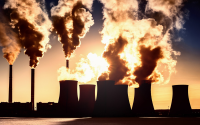3 May 2007Uwe Buse
It was about 10 a.m. when Rajendra Pachauri climbed up on a chair in the lobby of a European Union conference building in Brussels and turned to the cameras and microphones to give an improvised press conference. It was a situation to which the head of the Intergovernmental Panel on Climate Change (IPCC), the world's largest scientific commission, was unaccustomed. Normally Pachauri stands in front of podiums instead of on chairs to inform the public about the progress of his panel's work and the current state of the earth.
Pachauri held up his hands and asked the assembled journalists to be patient. It would be a while yet, he said, before the group preparing the IPCC's global climate report would be able to present its results. Discussions were still underway. In short, Pachauri couldn't tell the journalists what the current prognosis is for the future of the globe.
A laborious process
The discussions Pachauri mentioned were taking place in the large conference room on the third floor of the building. There, behind closed doors, politicians from more than 130 countries were arguing with the authors of the report of the precise wording of a thin, 23-page document. The document, known as the SPM, or Summary for Policymakers, contains the essence of the actual climate report, which is a scientific compendium divided into three volumes, each containing at least 1,000 pages. Negotiations were underway in Brussels over the summary of the second volume and, as always, it was a laborious process. The two groups debating the issue had little in common except a mutual interest in reaching a consensus.
On the one side were the authors of the report, all scientists, who have done little else in the last three years than work on this report. For many of them, it was already asking too much to compress the contents of more than 1,000 pages into a 23-page summary.
On the other side were the politicians, members of delegations from almost every country on earth. Sitting in alphabetical order in the chamber, their main concern was to adjust the report to suit their individual economic, environmental and foreign policies.
The delegations from the industrialized nations dominated the debate, especially that of the United States, which, as is so often the case, had sent the largest delegation. The Saudi Arabian delegation, not much smaller, was aligned with the Americans, as were the Australians and the Chinese.
Their opponents -- the report's authors, supported by the delegations from the core European Union countries, as well as Great Britain -- would register collective outrage each time the US delegation demanded that an unambiguous phrase like "will happen" be changed to a less clear "will likely happen." The US delegation submitted this request alone more than a hundred times. These objections were possible because the IPCC's rules make it possible to negotiate the summary line by line and word for word -- a necessary provision when so much could be riding on a single word. No other document has such a far-reaching impact on global environmental and industrial policy.
The IPCC is a scientific panel created by the UN Environmental Organization (UNEO) and the World Meteorological Organization (WMO). Once every five or six years it issues a report summarizing the current status of research on climate change. It operates on a minimal annual budget of only €5 million ($6.8 million). To be able to fulfill its mandate, the IPCC is dependent on assistance from UN members. They finance the conferences and provide the scientists who, as authors, are responsible for the contents of individual chapters.
The IPCC's headquarters in Geneva, Switzerland, consist of only a few glass-enclosed offices lining a hallway. The organization's real work -- reviewing, analyzing and summarizing studies -- takes place in research centers, institutes and universities around the world. The IPCC is a highly decentralized and very typical UN organization. Its leadership positions are handed out in the hallways and chambers of the political bazaar otherwise known as the United Nations. The IPCC's control board currently includes an Indian -- Pachauri -- a Russian, a Kenyan and a Sri Lankan researcher. The involvement of governments in the reports was part of the process from the very beginning. The organizations that established the IPCC -- the UNEO and the WMO -- wanted to prevent governments from using the reports as little more than notepaper. And the politicians were intent on preventing the scientists from gaining sole responsibility for the content of the reports.
Coalition of the unwilling
Shortly after the negotiations began in Brussels, the room became divided into a coalition of the unwilling, under US leadership, and a coalition of the willing, consisting of the authors with support from Old Europe. The overwhelming majority of participants were silent throughout most of the debate.
The US delegates used a classic tactic to achieve as many of their demands as possible, a tactic that has proven effective in many venues, from UN diplomacy to living situations to marital disputes. The Americans simply talked long enough, were hardnosed enough in refusing to compromise and kept submitting new demands until their opponents were worn down and exhausted, and finally gave in.
The same thing happened in Paris in early February, when the summary of the first volume was being debated and the central question revolved around the extent to which human activity is responsible for climate change. And the same thing is also likely to happen this week in Bangkok, where the parties will argue over the contents of the third summary and the question of what man can in fact do to avert climate change.
At noon on Good Friday, after a 22-hour marathon negotiation, Rajendra Pachauri went before the press, this time at a podium, and introduced colleagues who reported on what had been agreed in the chamber. At issue were the consequences of climate change, which are specified in the second volume.
The panel informed the world that 20 to 30 percent of all known species will become extinct if the rise in temperatures, measured from 1850 to the end of the 21st century, exceeds 2°C (3.6°F). The world also learned that there could be water shortages and more frequent flooding, and that food production would decline if global warming exceeds 3°C (5.4°F).
Pachauri, exhausted and his suit wrinkled by then, listened to what the scientists had to say. He knew what would happen after the press conference. The speakers' sentences would make waves, big waves, and in the space of a few hours they would reach virtually every corner of the earth.
And he was right. A headline in the next day's issue of German tabloid Bild read: "Climate Report Shocks Germany." The British Independent reported: "Mankind will be divided." US newsmagazine Time complained: "Our feverish planet badly needs a cure." The world was in a panic, almost as if there had been a major terrorist attack.
Pachauri had good reason to be pleased, and not just over the media reactions. The scientists, supported by their European allies, had warded off most of the attacks from the coalition of the unwilling. Concessions were made, but they were more symbolic than anything else. Because the IPCC's rules require that politicians produce scientific arguments to implement changes, the scientists have, in a sense, a home court advantage.
As pleased as he is about these rules, Pachauri is concerned about the critics who are not bound by the rules -- the outsiders. He calls them skeptics, and when he pronounces the word, he shrugs his shoulders as if he wanted to shoo away a fly. And then he says: "There will always be skeptics."
Down to earth and diplomatic
Pachauri is now sitting in a hotel room in Brussels, a surprisingly plain room for someone so high up in the UN hierarchy. Also, the fact that he has scheduled this interview here and not in a conference room rented specifically for this purpose suggested that he is a person who has not allowed his status to go to his head. Pachauri is an economist. When colleagues describe him they mention his beard, the way he combs his hair straight across his head and his diplomatic skills.
In his native India, Pachauri heads an institute that employs a staff of more than 700 and is devoted to sustainability. He has worked for the World Bank, is a consultant to the UN Environmental Program (UNEP) and teaches in the United States. He could be characterized as a member of his continent's humanitarian jet set.
Pachauri became head of the IPCC in 2002, when he was elected after being nominated by the US. The Bush administration had really wanted more of an obstructionist but was unable to find someone who would have been acceptable to other members of the organization. Instead, it nominated Pachauri, who had the reputation of being thoughtful and deliberate.
It was a miscalculation, though. Some time ago, Pachauri likened a critic of the IPCC to Hitler because the man had publicly reflected on whether it would make more sense to compensate and relocate the residents of Pacific island nations threatened by rising sea levels instead of attempting to keep sea levels somewhat constant.
Skeptics have hounded Pachauri since he took office, but he is anxious to play down their importance. In fact, he prefers not to discuss these people at all. But the deep-seated global debate that the IPCC has triggered with its reports, its analyses and its predictions also directs a great deal of attention to precisely these skeptics.
Questioning from skeptics
Is climate change truly manmade? Are the scientists' arguments convincing? Aren't there some scientists who hold completely different views? And this IPCC, isn't it really just a collection of political activists and eco-fundamentalists who are playing up their research results to transform all of mankind into users of public transportation and converts to car-pooling?
These are the questions the skeptics are asking, and they are debated in serious media outlets, including the influential German newspapers Frankfurter Allgemeine Zeitung and Die Welt and the television program heute journal. In other countries, like the United States, people like bestselling author Michael Crichton debate with Pachauri's colleagues on radio talk shows, experts debate the scientific foundations of the IPCC's reports on the TV talk show "Larry King Live," and in Great Britain the Channel 4 television network aired a documentary titled "The Great Global Warming Swindle."
The discussions revolve, among other things, around issues like climate sensitivity, Dansgaard-Oeschger events, the question of whether a global temperature increase of just under 0.8°C (1.4°F) in the last 100 years is a lot or a little, and whether the rise in CO2 levels is a consequence of increasing temperatures or vice-versa.
Who can answer these questions? Certainly not laymen. And neither can most politicians because they too are scientific laymen, and they too haven't the faintest idea what a Dansgaard-Oeschger event is. It's a difficult situation. A layman can only attempt to consider arguments he actually understands. And he can also attempt to discover whether the others, the critics, in fact have the better arguments.
The skeptics' figurehead is an American named Richard Lindzen. Lindzen is repeatedly referred to as the only one who, in the struggle for dominance in the climate debate, can compete in the same weight class as his opponents. These days Lindzen is much in demand and often on the road. He sits on the terrace of a hotel in Venice, facing the Grand Canal and the dome of St. Mark's Cathedral to the left. He fumbles in his pocket, pulls out a pack of cigarettes and lights a Marlboro.
He has come here directly from the United States. His delayed flight landed two hours ago, and he plans to fly back tomorrow. During his short stay, Lindzen plans to explain to Italian investors what this greenhouse effect means for them and their money. He has been asked to limit his comments to 20 minutes.
Lindzen is a 67-year-old physicist and a professor at the world-renowned Massachusetts Institute of Technology (MIT). His area of expertise is that of the physical processes that take place in the atmosphere and regulate the weather and climate. Lindzen is a theoretician, and he looks the part. His body seems a bit hunched over, as if its main purpose were to support the weight of his head.
An 'Alarmist' and 'Hysterical' Debate
In his speeches, articles and studies, Lindzen concedes that climate change is a reality, but he also insists that it is unclear whether the warming measured to date can be considered dramatic. He criticizes the models that are used to estimate climate change, calling them too imprecise and therefore unusable. Lindzen also says that the results achieved by his opponents in the scientific debate are based on arbitrary assumptions. He calls the SPM, the summaries of the IPCC reports prepared for the politicians, "alarmist" and the tone of the debate "hysterical." In his opinion, mankind would be better off addressing the world's true problems: wars, epidemics and hunger.
Perhaps Lindzen's overall criticism is correct. Perhaps his field is as dysfunctional as he claims, and perhaps his fellow scientists are more interested in manipulating than informing. After all, the world, and man, isn't driven purely by good intentions. But if this is the case, why is he the only one among serious critics who is expressing his outrage so vehemently? Lindzen's response: "It could have something to do with the fear of opposing the mainstream."
But Lindzen hasn't exactly suffered as a result of his critical stance. He is still a professor at MIT. He continues to conduct research and publish. He may be controversial, but he is also very well known. Indeed, he even seems to derive benefits from his position. Italian businessmen fly him in for presentations. The media court him and ask for his opinions. Lindzen was the skeptic who appeared on US talk show host Larry King's show, a crowning achievement in the United States for someone who wants publicity.
Lindzen's second argument is that the scientific research and discovery process is distorted. Instead of being devoted to truth, its main emphasis is opportunity, says Lindzen, which distorts the results.
A transparent global process
Lindzen's arguments sound convincing, but they are still nothing but claims, popular theories as opposed to a transparent global process, a global plebiscite among climate researchers.
The work on each report begins by reviewing all scientific studies in all relevant disciplines, summarizing them, organizing their results and then writing a first draft. This work is done by IPCC staff members, and their draft is accessible to scientists worldwide, who are invited to comment on it and submit suggestions for improvement. Each of these suggestions is considered and either incorporated or not. The lead authors of the individual chapters must maintain an accounting of their decisions, in the form of endless Excel tables that document the path and fate of each comment. When necessary, the authors are also required to justify their decisions to those submitting the comments and suggestions.
Once this process is complete the first draft is written. It is sent to all governments, which also have the option of submitting comments. Once again, the suggested changes are either incorporated or not. And once again, the scientists are at an advantage and the fate of each suggestion is meticulously documented. Finally the last draft is produced, which serves as the basis for the SPM, the production of which is similar to the production of the actual report and ends with the negotiation between scientists and politicians.
Lindzen's next argument goes like this: The scientists are exaggerating the dangers of climate change, because this is the only way to get the research funding they receive, primarily from their respective governments.
In the history of global climate research, the research budget in Lindzen's native United States has been inflated twice -- once during the presidency of the first President Bush and once during that of his son, George W. Bush. In both cases the injection of funding was preceded by a sentence uttered by the president: We know too little. If climate researchers wish to secure or expand their budgets, they shouldn't be saying: We are 90 percent certain that the lion's share of climate change is manmade. Instead, they should say: We know too little. But there is one climate researcher who says precisely these words: Lindzen.
Lindzen can argue that the models need to be more precise, and other, less competent critics can demand that details need to be better understood. This can happen, and will probably happen, but it is virtually impossible that these changes and these conclusions will throw doubt on the core conclusion of the current global climate report: Climate change is real, and it is overwhelmingly manmade.
When it comes to his one remaining argument, however, Lindzen is dead-on. The tone of the debate, he says, is hysterical.
There is hardly a newspaper article and hardly a TV or radio program that doesn't conjure up images of "climate catastrophe," prophesy floods of gigantic proportions, droughts and hunger. Indeed, the media have developed something akin to a complete apocalyptic program.
It's the fault of the media, of course, but not exclusively. It's also the fault of a new hero, an environmental activist who likes to introduce himself by saying: "Hello, I was once the next President of the United States of America."
Al Gore's film, "An Inconvenient Truth," is a PowerPoint presentation, a modern-day slide show about the causes and consequences of climate change. It also paints apocalyptic scenarios, and its dramatic climax shows large parts of Florida, as well as San Francisco, Beijing, Shanghai, the Netherlands, Bangladesh and New York, complete with the World Trade Center memorial, being swallowed by the sea. Gore spends a great deal of time on this sequence, in which each region appears on the screen and the regions ultimately disappear, one after another, into the dark sea.
The world climate report assumes that sea levels will rise by about 38.5 centimeters (15 inches). This is the mean of all scenarios, which predict increases of between 18 and 59 centimeters (7 and 23 inches). The report also states that sea levels could even rise by several meters if Greenland and western Antarctica were to become ice-free. According to the IPCC's estimates, this process, if it happens, would take several centuries, perhaps even millennia. Gore neglects to mention this time frame.
Instead, all he says is this: "If the ice on Greenland melts or slides into the sea, or if half of Greenland and half of western Antarctica become ice-free, the sea level will rise by seven meters." Gore makes it sound like something that could happen tomorrow.
Emotionalizing the debate
This doesn't mean that Gore should necessarily be taken to task for his statements. He is a politician. But it is odd to hear IPCC Chairman Pachauri, when asked what he thinks about Gore's film, responding: "I liked it. It does emotionalize the debate, but it seems that it has to do that." And when Pachauri comments on the publication of the first SPM by saying, "I hope that this will shock the governments so much that they take action," this doesn't exactly allay doubts as to his objectivity. When Renate Christ, the secretary of the IPCC, is asked about her opinion of reporting on climate change, she refers to articles that mention "climate catastrophe" and calls them "rather refreshing."
Stefan Rahmstorf, a professor of the physics of oceans at the Potsdam Institute for Climate Impact Research, one of the world's bona fide experts on the subject and the lead author of the current report, praised Gore's film unconditionally, even for its inclusion of the sequence depicting New York sinking into the ocean. And Rahmstorf's boss, Hans Joachim Schellnhuber, who serves as the institute's director and as an advisor to the German government, sounded a lot like Al Gore recently when he said in an interview: "We could see a one-meter rise in sea levels by 2100. The expected, climate-related shift in the ocean current could cause the water to rise by an additional meter in the Helgoland Bight." It sounds as if it could happen tomorrow. But it can't, and Schnellnhuber's colleague Rahmstorf, who has an inclination toward extreme scenarios, estimates that there is only a 10-percent probability that it will even happen at all.
Is activism trumping science?
No matter where one encounters officials from the IPCC -- at the organization's headquarters in Geneva, in Brussels during the negotiations over the SPM or in Potsdam, where the German authors, together with the Federal Ministry of the Environment, are staging a workshop on the world climate report -- everyone seems to be talking more like environmental activists than scientists these days.
In Potsdam, Michael Müller, a member of the Social Democratic Party (SPD) and a state secretary in the Federal Environment Ministry, pleaded for a sea change in energy policy on a global scale, and the tone of his arguments was not unlike that adopted by Pachauri, the chairman of the IPCC, in Brussels. When asked about this, climate researchers respond: "And? Where is there a problem? What's wrong with warning the world about a catastrophe?"
The problem is that the IPCC is not a political group whose goal is to exert pressure, but a scientific institution and panel of experts. Its members ought to present their results and analyses dispassionately, the way pathologists or psychiatrists do when serving as expert witnesses in court, no matter how horrible the victim's injuries and how deviant the perpetrator's psyche are.
Peter Weingart, a sociologist of science from Bielefeld, a city in northwest Germany, believes that the climate experts' lack of distance has something to do with their training. Scientists usually learn only to reflect on the results of their work, not on their role within the social decision-making process. As a result, they join forces with politicians who share their views. And in this way they do harm to science.
But Rahmstorf, the professor from Potsdam, dubbed a climate protection zealot by some, is unswayed by these arguments. He sees climate change as an existential issue, "a baptism by fire for the developing global society." Rahmstorf is the father of a baby, which he drives through Potsdam in a bicycle trailer. He doesn't own a car. He wants to do his utmost to leave behind for his child a world that is as similar to today's world as possible, at least as far as the climate goes. He feels responsible, as someone who sees the big picture. And in half a century, when many things will be clearer, when things may even be worse, he doesn't want to have to answer the question: Why didn't you do anything?
The same question haunts IPCC chairman Pachauri. This week he will be in Bangkok, where the subjects of debate will be possible solutions, distribution of the burdens and the structure of the future. Pachauri will sit on the podium, follow the debate and do what he believes he has to do -- be on the side of a good cause and not on the side of science.
Translated from the German by Christopher Sultan
http://www.spiegel.de/international/world/0,1518,druck-480766,00.html






